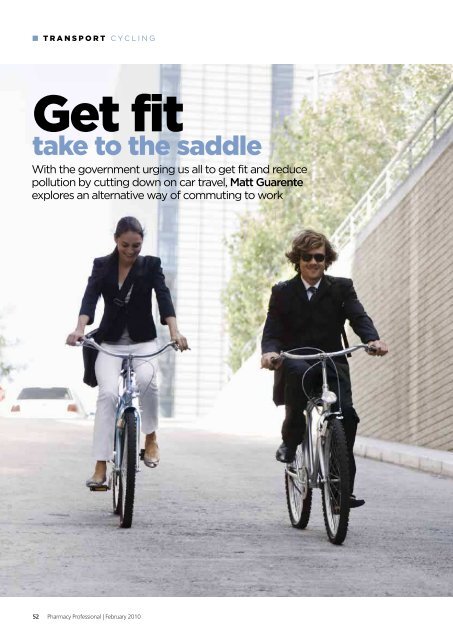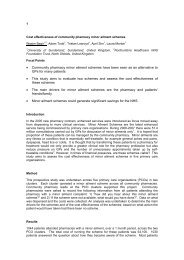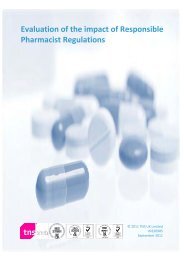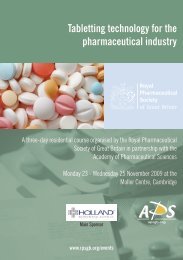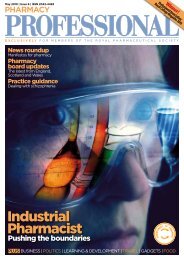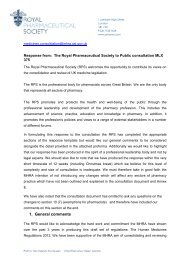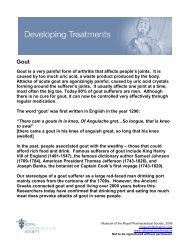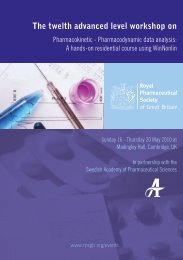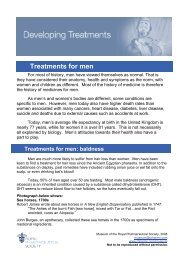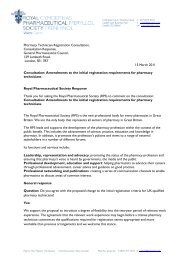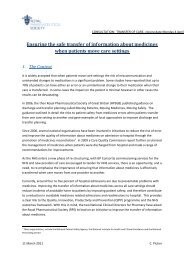Pharmacists in sport - Royal Pharmaceutical Society
Pharmacists in sport - Royal Pharmaceutical Society
Pharmacists in sport - Royal Pharmaceutical Society
Create successful ePaper yourself
Turn your PDF publications into a flip-book with our unique Google optimized e-Paper software.
T R A N S P O R T C Y C L I N G<br />
Get fit<br />
take to the saddle<br />
With the government urg<strong>in</strong>g us all to get fit and reduce<br />
pollution by cutt<strong>in</strong>g down on car travel, Matt Guarente<br />
explores an alternative way of commut<strong>in</strong>g to work<br />
ONE OF the surpris<strong>in</strong>g – or perhaps shock<strong>in</strong>g – statistics<br />
to come out of the government’s latest campaign on<br />
CO2 reduction is the amount we use our cars for very<br />
short trips.<br />
You may have seen the television adverts urg<strong>in</strong>g us all to drive<br />
five miles less per week. And while five miles might not seem<br />
like a lot, <strong>in</strong> fact almost a quarter of all car trips made <strong>in</strong> the UK<br />
are under two miles. Cutt<strong>in</strong>g five miles may be a good start – but<br />
cutt<strong>in</strong>g out all the short trips is even better.<br />
Two miles by bike, go<strong>in</strong>g at a moderate pace, would take around<br />
15 m<strong>in</strong>utes. Go<strong>in</strong>g two miles (say to work), and cycl<strong>in</strong>g back,<br />
would therefore quite happily deliver one of the recommended<br />
five-times-a-week exercise sessions where we get our hearts<br />
work<strong>in</strong>g at a decent clip for a period of 30 m<strong>in</strong>utes. Cycl<strong>in</strong>g is<br />
low-impact (for those of us who have creak<strong>in</strong>g jo<strong>in</strong>ts) and a good<br />
aerobic workout, burn<strong>in</strong>g around 100 calories on those two miles.<br />
Thanks to improved safety equipment, urban cycle networks<br />
and better awareness of the issues by car drivers, cycl<strong>in</strong>g is<br />
arguably safer than it ever has been – the numbers show that the<br />
more cyclists there are <strong>in</strong> a town, the fewer accidents <strong>in</strong>volv<strong>in</strong>g<br />
cars there are. If you need any more <strong>in</strong>centive to leave the motor<br />
at home, you’re roughly 30 times more likely to have a fatal car<br />
crash than a fatal bike accident.<br />
And there are good f<strong>in</strong>ancial arguments too. If you cycle<br />
all those two-mile trips you’d otherwise make <strong>in</strong> your car,<br />
government estimates put the annual fuel sav<strong>in</strong>g at £600 – not<br />
to mention per-mile driv<strong>in</strong>g costs that add an extra 35p a mile<br />
on average. Soon the cost of that sh<strong>in</strong>y new bike will be more<br />
than paid back… so, where do you start? If you already have a<br />
bike sitt<strong>in</strong>g around somewhere, take it <strong>in</strong>to a bike shop and get<br />
it serviced. This can cost from £30 for a basic service, check<strong>in</strong>g<br />
everyth<strong>in</strong>g is lubricated, tightened and safe. You might need new<br />
tyres (perished tyres are a major cause of accidents) and work<strong>in</strong>g<br />
lights are a must. Get a good lock, and th<strong>in</strong>k about mak<strong>in</strong>g any<br />
quick-release items like wheels or seats rather more difficult for a<br />
thief to, well, quickly release.<br />
There are pro and con arguments for helmets, but if as little<br />
as £25 stood between me and a dent <strong>in</strong> my head, I’d take the<br />
f<strong>in</strong>ancial hit. Specialized make some of the least offensive ones<br />
out there should you wish to keep a low profile.<br />
High-vis cloth<strong>in</strong>g, which could be anyth<strong>in</strong>g from a reflective<br />
‘Sam Browne’ belt to a full fluorescent (or even illum<strong>in</strong>ated) backpack<br />
cover, jacket or vest, is a good idea. Mak<strong>in</strong>g sure you have<br />
adequate protection from w<strong>in</strong>d and ra<strong>in</strong> is essential too, and if you<br />
are worried about air quality then effective masks with replaceable<br />
filters are easily available. If you have a shower facility at work<br />
then you might have to make some logistical arrangements to<br />
br<strong>in</strong>g <strong>in</strong> or keep work clothes there.<br />
Panniers can hold tons of stuff, and you could ditch the<br />
supermarket trip altogether (and be more green) by order<strong>in</strong>g<br />
groceries onl<strong>in</strong>e rather than mak<strong>in</strong>g the short trip <strong>in</strong> the car.<br />
Of course you might want to get some idea of the good you’re<br />
do<strong>in</strong>g for your body, so hav<strong>in</strong>g a heart-rate monitor is worthwhile.<br />
Polar watches with heart-rate and various other metrics start at<br />
£40. Speed demons may want a bike computer that measures<br />
MPH – and cyclists can get f<strong>in</strong>ed for break<strong>in</strong>g speed limits. Æ<br />
52 Pharmacy Professional | February 2010<br />
February 2010 | Pharmacy Professional<br />
53


